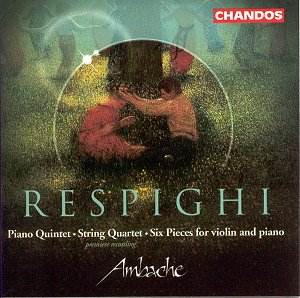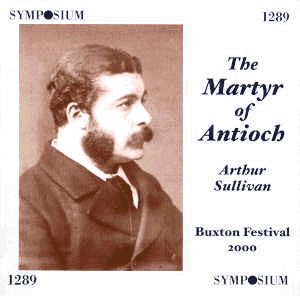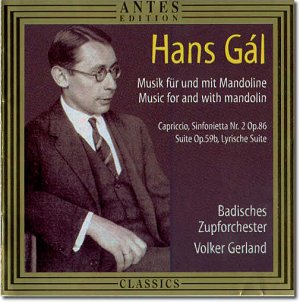 Composer: Ottorino Respighi
Composer: Ottorino Respighi
Works: Piano Quintet in F minor (1902), String Quartet in D minor (1909), Six Pieces for Violin and Piano (1901-1905)
Performers: Marcia Crayford (violin), Ruth Ehrlich (violin), Martin Outram (viola), Judith Herbert (cello), Diana Ambache (piano)
Recording: Recorded at St Michael’s Church, Highgate, London, 14-16 November 2000
Label: Chandos CHAN 9962
Ottorino Respighi, often overshadowed by his illustrious tone poems like “Fountains of Rome” and “Pines of Rome,” reveals a fascinating facet of his compositional voice in this collection of chamber works. Composed during his formative years, these pieces reflect the eclectic influences of his musical environment, blending the lushness of Brahms with the vivid color palette reminiscent of Rimsky-Korsakov. The recordings offer a compelling opportunity to engage with Respighi’s early output, which is often eclipsed by his later orchestral masterpieces.
The performers, the Ambache ensemble, bring a commendable vitality to the music, deftly navigating the intricate textures and emotional landscapes of Respighi’s chamber works. The Piano Quintet in F minor showcases a vibrant interplay between piano and strings, with Diana Ambache’s piano exuding a confident lyricism that complements the string players’ rich, cohesive sound. The Allegro movement, marked by its passionate themes, is delivered with a sense of urgency that captures the listener’s attention, showcasing the performers’ technical prowess and interpretive insight. The ensemble maintains a sensitive balance throughout, skillfully negotiating the work’s dynamic contrasts.
The String Quartet in D minor also merits attention for its structural ingenuity and emotional depth. In the Presto, the ensemble executes rapid passages with precision, creating an exhilarating sense of momentum. Notably, the second movement, Andante, offers a lyrical respite, where the musicians’ phrasing reveals a deep understanding of the music’s melancholy undercurrents. The string players, particularly Crayford and Ehrlich, demonstrate exceptional blending, achieving a sonorous homogeneity that enhances the lyrical lines. Their interpretation captures the duality of Respighi’s heritage, balancing the Germanic rigor with the Italian warmth that permeates the work.
The Six Pieces for Violin and Piano, a delightful addition to the recording, encapsulate Respighi’s melodic charm and flair for color. Here, the interplay between Crayford’s violin and Ambache’s piano is particularly striking; their dialogue is both playful and intimate. The third piece, marked Allegro, features a buoyant theme that is executed with a delightful lightness, showcasing the musicians’ ability to infuse the music with a sense of joy and spontaneity. The engineering quality of the recording is noteworthy, with a clarity that allows the nuances of each instrument to emerge distinctly, ensuring that the intricate counterpoint is both audible and engaging.
The recording stands out in a landscape where Respighi’s chamber music is often overlooked, and while there are other performances available, such as those by the Borodin Quartet, the Ambache’s interpretation is imbued with a freshness that invites repeated listening. Their commitment to capturing the spirit of the music, alongside a flawless technical execution, positions this recording as an essential discovery for those exploring Respighi’s oeuvre.
This disc not only illuminates a lesser-known aspect of Respighi’s artistry but also exemplifies the potential for rediscovery within the chamber music repertoire of the early 20th century. The Ambache ensemble has crafted a compelling listening experience that balances historical respect with interpretative flair, inviting both seasoned listeners and newcomers alike to revel in the charm and sophistication of Respighi’s music.



